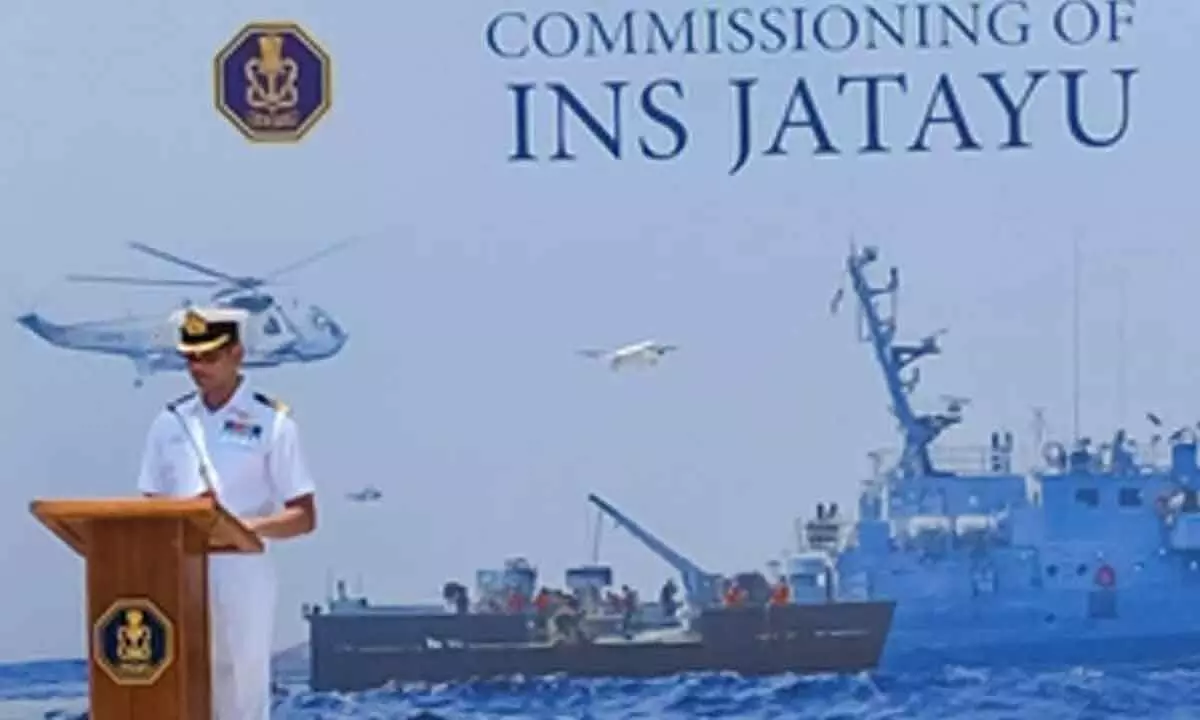India’s new naval bases INS Jatayu near Maldives and Agalega in Mauritius are welcome boosters
The new base will significantly boost anti-piracy and anti-narcotic operations
image for illustrative purpose

The timing of this initiative holds particular significance, given the challenges in India's relations with the Maldives following the election of pro-China President Mohamed Muizzu. The Indian Navy is set to fortify its maritime presence in the Lakshadweep islands
The Indian Navy has a new strategic perch in the Indian Ocean Region (IOR) with the commissioning of ‘INS Jatayu’, a naval base in Lakshadweep near Maldives and the opening of an airstrip and a jetty that India built on the Mauritian island of Agaléga off the coast of Africa in the western Indian Ocean on February 29.
Agalega is a boost to the navy’s strategic sea legs, giving it the ability to maintain and sustain prolonged surveillance of the western Indian Ocean and will enhance the country’s ability to monitor its large exclusive economic zone (EEZ). This covers the Horn of Africa, where pirates are active, and also Djibouti, where China’s navy has a base. From Agalega, the Indian Navy can operate a variety of platforms, including the P8I maritime surveillance aircraft, drones, helicopters and, of course, surface ships.
The runway was extended from 1,300 meters to 3,000 meters to accommodate larger aircraft, and the St James Jetty underwent expansion from 80 meters to 255 meters. These enhancements in Mauritius, combined with the coastal surveillance radar system in the Seychelles, will empower India to improve its monitoring of critical sea lanes in the Indian Ocean. This development becomes particularly significant as the leadership in the Maldives, leaning towards China, has recently scaled down maritime security cooperation with India.
With a new naval base in the Arabian Sea, INS Jatayu, commissioned on March 6, will be a major boost for the Indian Navy and India’s security infrastructure. This will be the second naval base in Lakshadweep. The Indian Navy already has a base on Kavaratti Island called INS Dweeprakshak. INS Jatayu – is on the southernmost island of Lakshadweep – the Minicoy Island, 258 km from the Maldives. The Navy said in a statement that the new base will extend New Delhi’s “operational surveillance” of the area. The Navy said, “Minicoy is the southernmost island of Lakshadweep, which straddles the vital sea lines of communications.”
The new base will also significantly boost anti-piracy and anti-narcotic operations. It is part of the Navy’s plan to ‘incrementally augment security infrastructure at the strategically important’ islands.
“INS Baaz in the Andamans to the east and now INS Jatayu in the west will serve as the Navy's eyes and ears to safeguard our national interest," said Chief of Naval Staff Admiral R Hari Kumar during the commissioning of INS Jatayu.
He also disclosed that INS Jatayu will be developed to have a dual-use airfield at Minicoy, and the land allocation for establishing an Indian Air Force radar base is already on.
Strategic importance of INS Jatayu
The Lakshadweep Islands constitute a chain of coral islands in the Indian Ocean, positioned between the Maldives to the south and the Chagos archipelago further south of the equator. Given their strategic location in the Indian Ocean, these islands are of considerable importance to India. The Indian Navy asserts that establishing a self-sufficient naval unit equipped with essential infrastructure and resources in the area will enhance its overall operational capabilities on the islands.
With the induction of INS Jatayu, the Indian Navy is poised to strengthen its position along the western seaboard. The proposed airfield is strategically designed to support a range of aircraft, including P8I maritime reconnaissance aircraft and fighter jets. This expansion aims to amplify the Navy's operational reach and surveillance capabilities, strategically aligning with India's endeavours to counter the increasing Chinese influence in the Indian Ocean Region. The timing of this initiative holds particular significance, given the challenges in India's relations with the Maldives following the election of pro-China President Mohamed Muizzu.
The strategic importance of commissioning INS Jatayu is underscored by its timing, occurring just days ahead of India's planned withdrawal of all personnel from the Maldives.
President Mohamed Muizzu of the Maldives has formally requested India to withdraw 89 personnel, with the initial group scheduled to depart by March 10 and the complete withdrawal expected within two months.
Naval Detachment Minicoy was established in the early 1980s, and the establishment of an independent naval base is poised to augment the overall operational capability of the Indian Navy significantly. This development will elevate the Navy's role as a primary responder in the region and enhance connectivity with the mainland. With the introduction of INS Jatayu, the Indian Navy is set to fortify its maritime presence in the Lakshadweep islands.
Over time, INS Jatayu is slated for expansion, evolving into a larger base capable of accommodating aircraft carriers. Such expansion will bolster military surveillance capabilities in a region where only one airport currently exists at Agatti. The presence of aircraft carriers INS Vikramaditya and INS Vikrant during the commissioning of INS Jatayu signifies India's resolve to strengthen its influence in the area.
The area has witnessed increased activities involving Chinese submarines and research vessels, with China fostering close collaboration with the Maldives.
In recent months, the Chinese research vessel Xiang Yang Hong 03 conducted oceanic surveys beyond the boundaries of the Exclusive Economic Zones (EEZs) of India, Sri Lanka, and the Maldives before eventually docking at Maldives.
India has been actively enhancing its capabilities in the Indian Ocean region, directing attention to its islands and supporting allied nations in capacity building.
(The author is a journalist, who writes on defence, strategic affairs and technology)

